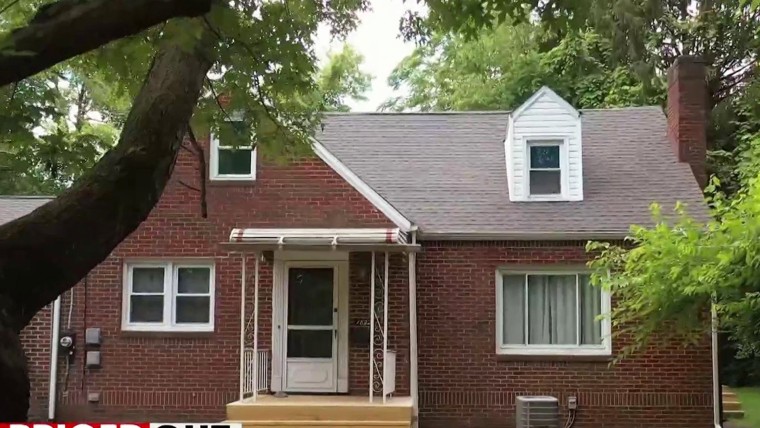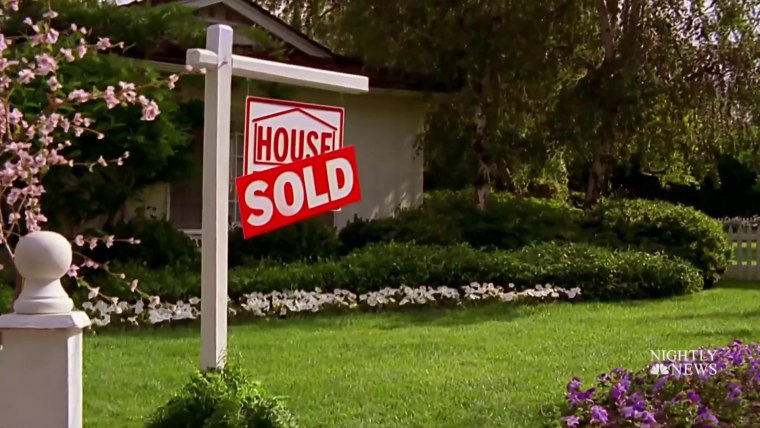Who's outbidding you by tens of thousands of dollars for that home of your dreams? A hedge fund



The lack of supply of single-family homes has pushed up housing prices in many markets across the country — but would-be homebuyers find they are being outbid not just by other home seekers, but also by hedge funds.
"In the current neighborhood, I've been surprised at how many homes have sold recently and sold to investment groups," said Nathan Saunders, a homebuyer from the Dallas area.
Saunders grew up in Dallas, where finding a house where he and his wife could raise their 2-year-old son was a grueling process, he said.
"My wife and I have been looking for a house for roughly the past year," he said, adding that they have made multiple offers. "On each of those, we had contractors or investment groups outbidding us on the properties."
Such buyers often come armed with the kind of financial firepower ordinary Americans can't hope to match, housing experts say.

"Historically, the vast majority of these investors have been mom-and-pop landlords, but after the 2008 bust ... we saw institutional investors and other funds enter this market," said Karan Kaul, senior research associate for the Housing Finance Policy Center at the Urban Institute.
"If you're a first-time homebuyer and you're depending on a mortgage that takes two months to close and you're competing against someone who's making a cash offer, you're at a disadvantage right off the bat," Kaul said.
"I can drive through the neighborhood and I know exactly which ones are rentals, because the lawns are unkempt."
David M. Dworkin, president and CEO of the National Housing Conference, said that cash offers typically make up about 25 percent of the market but that over the past year, the proportion soared to nearly 1 in 3. "This is having its worst impact on first-time homebuyers, who generally are more dependent on mortgage financing and have limited budgets," he said. "It's hurting millennials. ... It's also hurting people of color who are trying to become homeowners."
Kaul said competition from investment entities is a symptom of a much bigger problem in the housing market. "The reason why we have this supply crisis right now goes well beyond investors. We just haven't produced enough housing in the past 10 years," he said.
The supply crunch is unlikely to ease in the near future. Although housing starts rose more than expected in June, building permits — which foreshadow starts — surprised economists by falling by about 5 percent, a steeper drop than had been anticipated.
In locations where big tech companies have recently expanded, influxes of workers moving in from pricier enclaves aggravate the challenge. Especially in smaller cities, the sheer number of new arrivals can strain the availability of inventory. "There are very clear, significant growing pains when that happens," Dworkin said.

Housing prices at record highs across the country
Jami Mumley, a Realtor with North Texas Top Team Realtors, said: "In addition to competing with investors, who are often cash buyers, people are competing against individuals who are moving from markets where real estate may be more expensive. Those folks who are coming can often pay cash for a house. ... Right now, it's just very disheartening for buyers."
Suzanne Athey, a real estate broker with Re/Max Dallas Suburbs & Remarkable Property Management, who worked to help the Saunders family find a home, said: "When you have an investor coming in and outbidding them by thousands and thousands of dollars, it's hard to compete with that." In addition, she said, investment entities are often willing to buy houses sight unseen and to waive inspections and appraisal contingencies.
The appraisal contingency waiver, which stipulates that a buyer is locked into the offer price even if the lender determines that the house isn't worth that much, is the most common of the waivers, according to the National Association of Realtors. It also is of particular concern to housing policy experts, who say widespread use of the practice can encourage bubbles
"The appraisal is one of the controls we have on markets' overheating above their value. The reason we have appraisals is to ensure the market isn't overbidding homes beyond what they're worth," Dworkin said.
A deluge of investor dollars into a neighborhood magnifies the distortion. "If you're buying as an investment property or to flip it, that's very disruptive to markets," Dworkin said. The practice affects not only would-be homebuyers but also people who live in neighborhoods that are undergoing transformations from owner-occupied to investor-owned rentals.
Marcos Cartagena, who still lives in the Phoenix-area house he grew up in, worries that the area is getting too expensive for his college-age daughter to put down roots, thanks to the number of investor-owned rental properties that have driven up housing prices.
In one Phoenix neighborhood, housing that had typically attracted solidly middle-class families is being 'snapped up' by investors from out of state.
"All these old neighbors are dying off or going to homes. Their children aren't here in the state anymore, and they sell the house for top dollar," he said. "They sell to investors. They don't sell to people looking to live there."
In recent years, Cartagena said, much of the neighborhood — 1950s housing stock that had typically attracted solidly middle-class families — had been snapped up by investors from out of state, including the house next door.
"They were asking for the highest rent in the area we've ever seen. Our mortgage is under $1,000 a month ... and even recently you could rent a home for, like, $1,500," he said. The new owners, he said, converted a great room added by a previous owner into a fourth bedroom and charged $2,400 a month — too high for even a double-income family to afford.
Instead, the house was rented by a group of adults, which created parking and traffic issues, Cartagena said.
"You can tell which homes have rentals because you see more cars parked on the streets," he said. "They've always allowed on-street parking, but that was for guests. This is an everyday occurrence, and the streets aren't that wide." Five cars regularly park in front of his former next-door neighbor's house or on the property, he said.
In addition, Cartagena said, some of the ever-multiplying investor-owned properties were poorly managed and maintained. He said he learned from talking to some of the new residents that even though rents had risen significantly, they were responsible for landscaping — a cost it seemed few could bear on top of the expense of renting.
"I can drive through the neighborhood and I know exactly which ones are rentals, because the lawns are unkempt," he said.
Ultimately, appealing to a sense of neighborhood cohesion is what gave Saunders and his family a happy ending to their monthslong quest. After placing an offer on yet another property this month, Saunders wrote the sellers a letter, enclosing a picture of his toddler and detailing the family's dream of settling in, renovating and investing the time and money to turn the house into a home.
It worked. Saunders and his wife had bid $30,000 over the asking price, but Athey, their Realtor, told them they weren't even close to the top offer — and Saunders knew he was in the running against corporate interests. "It was shocking to hear our offer was finally accepted," he said.
Saunders said he believes the seller was willing to take less money because his family was looking to put down roots, not drive returns.
"I do believe that kind of has something to do with it," he said.






Around here it is flippers too. I know some people that live a little up north more in the country. It was a doublewide on 2 acres. She could not get a good price for it and ended up selling for 50k. The people just painted the place, slapped the cheapest granite they could find on the counters and rebuild the deck.
Now it is on the market for 145k. For the same trailer, just with new counter tops...
There are a couple rentals in my neighbor hood, I can tell which ones they are. Usually have a high turnover. Down my cul-de-sac though they are all owned, the same people have been here for years. Most longer than I have.
We have a couple of local companies that have been buying up homes and putting in the very cheapest fixes and either renting them or selling them for top prices. They have been doing it for years. I rented from them once after they purchased the apartment building we were in. The first thing they did (after raising the rent) was put in separate heating and water for each unit AND removing our individual washers/dryers to install coin machines that were perpetually broken. We moved across town and now both sides of us are rentals. The house behind us was bought and then the owner moved and rented it. The house across our street was purchased by a heating and cooling company and is now being rented by one of their employees... Rentals are killing the housing market here and driving up prices.
This trend sucks. Where I live the economy is tourist driven, so most all of the houses around here are bought by people not from the area or by LLCs, who then turn the property into a short term rental. Good luck finding even a lease unit around here.
I live in a retirement community with some pretty strict rules on renting and of course if they do qualify they have to be 62 years old so it stops most rentals. In the non-retirement communities in the city, LLC/hedge funds and flippers are buying them up.
This is not a good trend at all.
When I moved into the Senior Apartments where I now live in 2014, the required age was 50. In 2018 the required age was 55. As of this year the required age is 60. There are over 450 unit, including Studios, and 1 and 2 bedrooms. They pretty much frown on additional family members under that age living with qualified residents, unless they are necessary caregivers, and then they also have to be registered as residents. There are not many who require caregivers, so most everyone who lives here is 60 or older.
The rules here are very strict and breaking the rules can be grounds for eviction.
Economists agree 2-3% longterm mortgages are hedges against inflation. Every realistic economic model predicts much higher rates over the next few decades. We can blame this all on our unnaturally low (see subsidized) home mortgage rates and the unsustainable tax breaks on those mortgages we give to ourselves...
Are we currently in a stock market and real estate bubble? Indubitably! The entire supply chain has been severely disrupted by the pandemic, but the free market has many ways of correcting that...